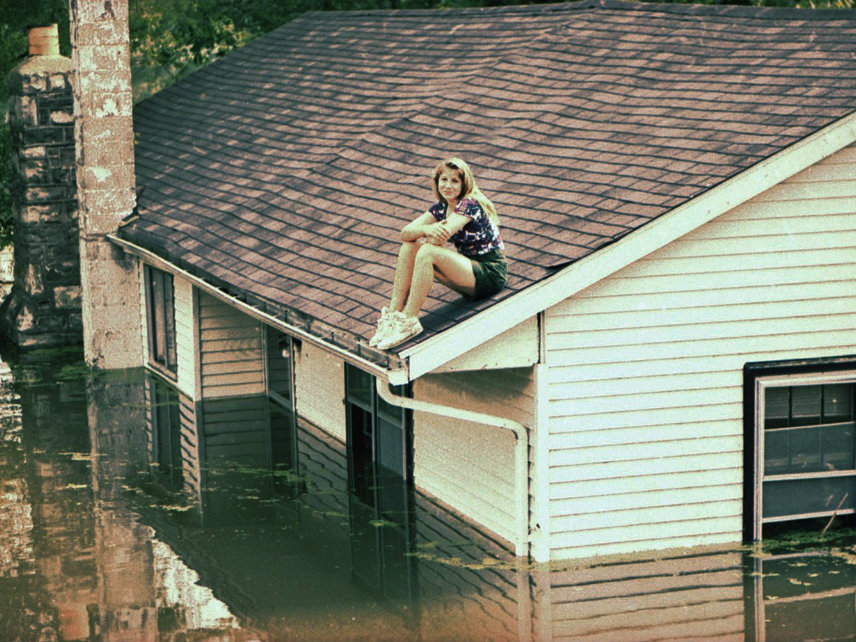Senate Votes to Extend Federal Flood Insurance Funding
It's a regressive, debt-ridden program that transfers wealth from regular Americans to the rich.

The Senate voted 86–12 this week to keep funding the National Flood Insurance Program (NFIP) until November. The House passed the same bill last week, so it's now on its way to the president's desk.
Too bad. When Sen. Mike Lee (R-Utah) voted against the bill, he rightly called it "fiscally unsustainable" and "structurally unsound." It's also a handout to the rich.
When Congress created the NFIP in 1968, it was trying to shrink the role of federal aid in disaster-prone areas by offering incentives to undergo risk mitigation. But instead of reducing the need for federal dollars, the program done the opposite. The Congressional Budget Office estimates that the NFIP is around $30 billion in debt.
Lee tried to mitigate the fiscal blow with an amendment that would have capped the payouts at $2.5 million, but the measure failed to get enough support. Meanwhile, other legislators called for rushing the bill through. "We need to reform this program, but we also need to keep it alive through the end of hurricane season," said Sen. John Kennedy (R-La.). The NFIP insures more than five million properties; failing to reauthorize it would amount to "scaring" the policyholders, Kennedy said.
But the people who benefit from the NFIP do not tend to be impoverished Americans looking to rebuild their lives after hurricanes. Homes covered by the insurance program are, on average, more expensive than those not covered by the programs.
A Cato Institute report last year found that the median value of a subsidized coastal property was $402,768, while the median value for an unsubsidized property on the coast was a much smaller $339,842. Another study—this one from the University of Massachusetts, Dartmouth—found an "inverse relationship" between property values and premiums: The owners of higher-value properties paid a smaller premium than the owners of lower-value properties. In effect, taxpayers across America are subsidizing the lifestyles of rich people with waterfront homes.
Congress may want to create incentives for risk mitigation, but artificially low flood insurance premiums incentivize people to live in riskier areas. People should be free to choose where they want to live, but it's shouldn't be the role of the government—especially a government $21 trillion in debt—to take bail out wealthy citizens' risky decisions.
Editor's Note: As of February 29, 2024, commenting privileges on reason.com posts are limited to Reason Plus subscribers. Past commenters are grandfathered in for a temporary period. Subscribe here to preserve your ability to comment. Your Reason Plus subscription also gives you an ad-free version of reason.com, along with full access to the digital edition and archives of Reason magazine. We request that comments be civil and on-topic. We do not moderate or assume any responsibility for comments, which are owned by the readers who post them. Comments do not represent the views of reason.com or Reason Foundation. We reserve the right to delete any comment and ban commenters for any reason at any time. Comments may only be edited within 5 minutes of posting. Report abuses.
Please to post comments


Yes the government literally incentives people to live in unsafe areas. If they want to live there so bad, they can pay the cost of their own damn insurance. Wait, no one would insure it otherwise? Then maybe they shouldn't live there...
Spot on!
The problem isn't that it's a subsidy for the rich, because that's implying if it primarily helped the poor it would be OK. That's not the point at all; it's terrible policy without that aspect of it.
*barf
Get rid of building codes and take an island philosophy; build cheap and let the hurricane blow it away, then rebuild it cheap and wait for the next one. In the meantime, cheeseburger in paradise.
This article is pathetically under informed. THREE glaring grammar errors in a short article. If you don't even bother to proofread it, then it totally makes sense that you got your facts wrong. As a catastrophic insurance adjuster by trade, you aren't even in the ballpark of the truth about the NFIP. Subsidies for the rich?? LMAO
You say the statistics are wrong, so what are the true numbers?
Does Reason need a proof reader? Second article today with obvious, sloppy composition errors.
Since the government is doing a nice job of providing an insurance policy against the claim of disasters like water, fire, hurricane, flood damage Glendale.There are homeowners facing flood damage or water damage Glendale ( https://www.alliancepublicadjusters.com ) which an insurer claims to an company for the further process.
Hey, If you are looking for one of the best portal which will let you know about how do I get microsoft windows 10 help and will also show you all exact path for the same purpose. Try out for once surely you will be having all beneficial information.